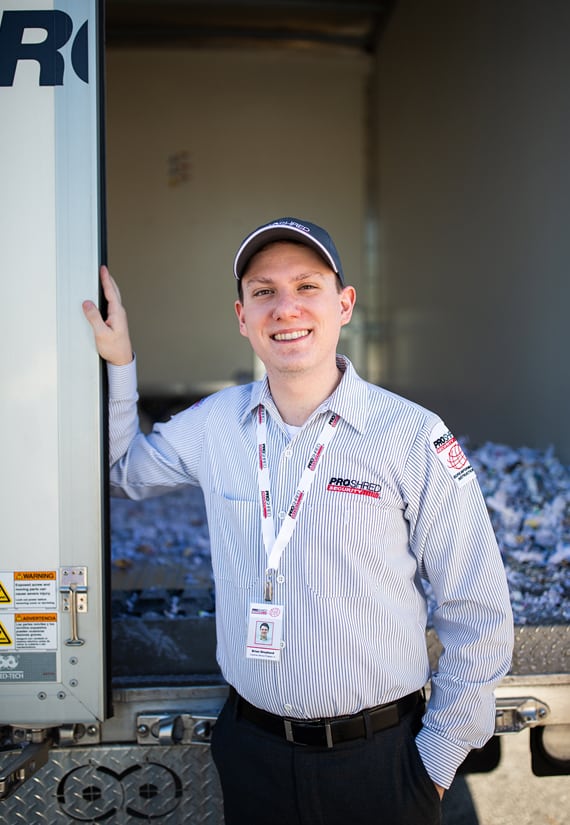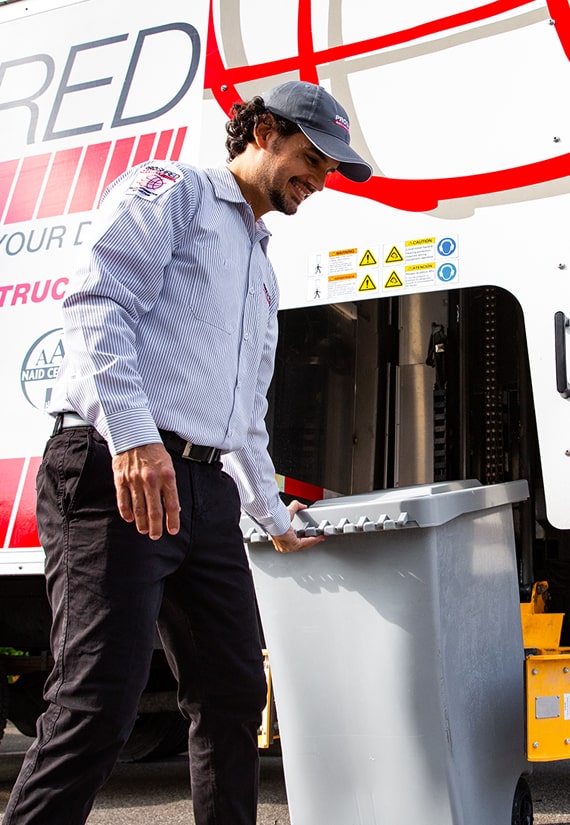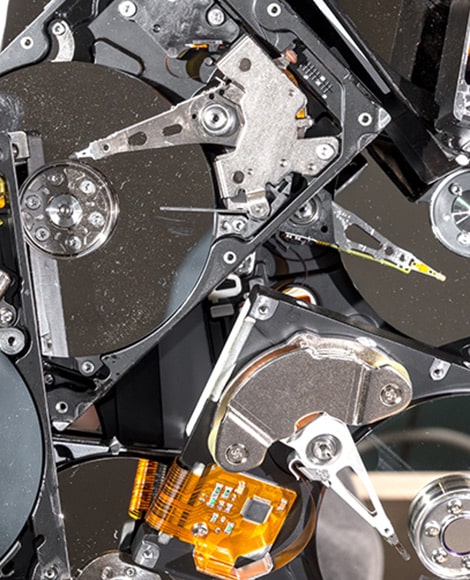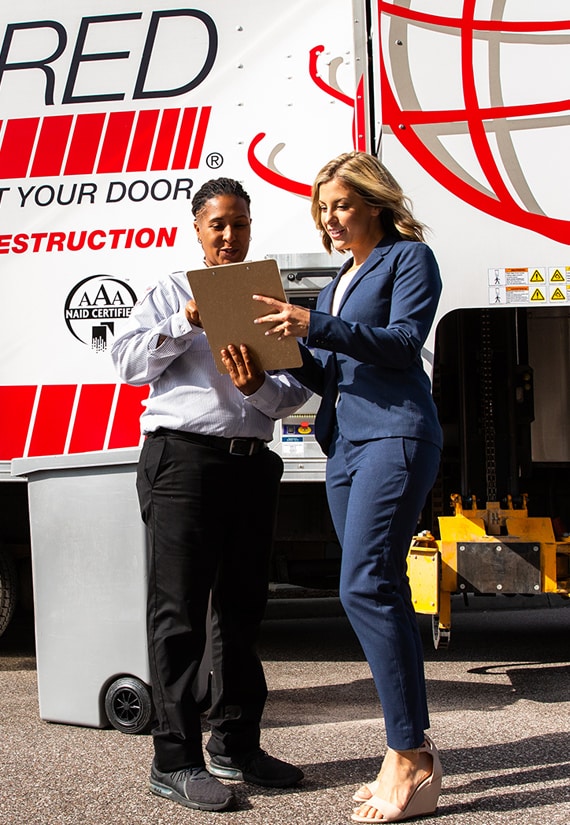August 5, 2021
Ultimate Guide on What to Shred (And How to Prevent Identity Theft)
We all collect a lot of paperwork throughout our lives. From bank statements to birth certificates to receipts, one of the prevailing struggles that comes with collecting all of these documents is figuring out what you actually need to keep, and what should be disposed of.
Incorrectly disposing of excess information poses many security risks, which can potentially be detrimental to you or your organization. Identity theft is a major risk when it comes to simply tossing all of your documents into the trash can.
Thankfully, there are solutions to help keep your information secure. To protect yourself and others from having private information fall into the wrong hands, you should always shred important documents when they are no longer needed. Continue reading for a helpful guide on when, where, how, and what to shred in Baltimore.
What should I shred?
When deciding what you should shred, the first thing you need to ask yourself is: what kind of items should you be concerned about protecting? This is one of the most important things to consider throughout this process, and for good reason. Items that contain sensitive information and/or information that can be used against you (or your client, your patient, or your company) should be top priority.
What documents should I shred?
You should consider shredding any documents that contain any sensitive information that includes names (maiden names as well), addresses, phone numbers, emails, account numbers, driver’s license numbers, birthdates, passwords or PINs, signatures, or Social Security Numbers (SSNs). Identity thieves can legally look through your dumpster to get these documents and use them for nefarious purposes.
This includes but is not limited to:
- Expired passports and visas
- ID cards that are no longer valid
- Copies of important documents like birth/death certificates and marriage licenses
- Utility bills
- License Plates
- Billing statements for credit cards
- Paid (and undisputed) medical bills and records
- Legal documents
- Travel itineraries and airline tickets
- Sales receipts
- Old pay stubs
- Resumés
- Report cards
- Canceled and voided checks (that aren’t tax-related)
- Junk mail like credit card and insurance offers
- Old photographs that you plan on tossing out

What items should I shred?
Though documents tend to be an obvious thing to shred, you may forget that documents are not the only items that contain sensitive information. Other devices that may contain private data that you may not want getting out are things like computers, tablets, phones, and other old electronic devices. Hackers may still be able to recover residual data stored in the hard drives of these devices, meaning that deleting your information is simply not enough.
In reality, it is actually incredibly difficult to completely erase data from hard drives. When you do not take the necessary steps to destroy the hard drives of electronic devices, you risk having sensitive information from yourself, your business, your client, or your patient fall into the wrong hands. Luckily, hard drive destruction has become a quick and easy process thanks to advancements in shredding technology.

How to Shred Documents
You may now be asking yourself “how can I shred my documents?” The most obvious answer is to purchase your own small paper shredder for your home or office. However, this may not be the correct choice for everyone. For many, these small paper shredders waste valuable man hours for those who have a large number of documents to dispose of, not to mention the hassle of the inevitable paper jams and having to empty the containers often. Co-workers and family members may also find the loud noises these shredders produce bothersome.
There are also potential security risks that come with these personal shredding machines. Typically, the standard versions of these machines that you would find in a store are only designed for one style of shredding, called “spaghetti-cut” or strip cut. This is where the machine cuts the paper into long pieces up to ½ inch wide. These lengths of paper are surprisingly easy to piece back together into a clearly legible document when taken out of the trash.
One of the most secure ways to shred your documents when you need on-going document destruction is by using a regularly scheduled on-site paper shredding service. This is when a secure truck with a built-in industrial shredding machine visits your location and shreds all of the requested documents right then and there. These trucks even have a screen mounted to the side of the truck where you can watch all of your papers go through the shredding machine to ensure that they are completely destroyed.
Perhaps you don’t have a location with enough space to accommodate a shredding truck on-site, or don’t have a large enough volume of paper to justify needing one. In this case, another popular document destruction service, drop-off paper shredding, may work better for you. Drop-off paper shredding is a simple service for residential customers and small business owners, where those customers can bring their documents to a location near them to be disposed of safely. Just like with the on-site services, you can watch your confidential paperwork be securely shredded for yourself so you can confidently leave knowing your personal data will not fall into the wrong hands.
However, you may have too many documents to transport to a location to be destroyed, or continuing service just does not make sense for your business. In this case, you may want to consider one-time purge shredding. This bulk shredding service is perfect for those who need many documents securely disposed of at once, whether from their home or office. With this service, you can still receive the piece of mind that comes with witnessing your private information being destroyed first-hand before our trucks leave your location.
How to Shred a Hard Drive
Now what about your electronic data? Like most people, you likely store quite a bit of sensitive information on your electronic devices. Even if you mainly use a cloud-based system for storage, in all likelihood your devices still use internal device storage as a place to back up your data for an extra layer of security. When it’s time to dispose of your electronics, it’s important to destroy these drives to prevent electronic data theft.
As mentioned previously, hard drive shredding has become a quick and easy process in recent years. You should think of hard drive destruction in the same way you would document destruction as this is the only way to absolutely guarantee that the information you’re destroying is protected. During the shredding process, the hard drive is physically obliterated, rendering it completely unusable and the retrieval of any and all information on the drive impossible.
Hard drive shredding can be completed at a Proshred® location as well as by shredding trucks on-site. Not only can you witness your hard drive being destroyed, you will be provided with a Certificate of Destruction for you to keep for your own records. This document proves that your hard drives were correctly disposed of following the legal guidelines in place for data destruction across multiple industries.


How to Shred Products
There is another category of items that can be shredded using what we call a product shredding service. Proshred® Baltimore not only provides safe and secure document and hard drive shredding services, we also provide confidential and streamlined product destruction.
For non-paper product destruction, confidential and sensitive items are incinerated to prevent those items from getting out into the public, where they could expose your information or be used to misrepresent your brand.
Using our certified product destruction service eliminates that risk by ensuring that the products are properly disposed of following our one-of-a-kind product destruction procedure. We recommend this service to anyone in the manufacturing, medical, and law enforcement fields as well as nonprofit organizations and even general businesses.
Complete product destruction through incineration is the only way to ensure that private items like medical records, prescription bottles, outdated apparel and uniforms, ID cards, debit/credit cards, and recalled products and equipment are safely and securely disposed of.
When to Shred
One of the biggest challenges when it comes to shredding your items is deciding how long to keep the items before looking into a destruction service. In general, most things fall into 4 categories: keep for up to 1 year, shred after 3 years, shred after 7 years, and keep forever.
Under the “keep for up to 1 year” category, we have things like:
- Purchase orders
- Correspondence with customers and vendors
- Duplicate deposit slips
- Receiving sheets
- Requisitions
- Paid utility bills
- Credit offers
- Sales and ATM receipts
Items you should shred after 3 years include:
- Employee records (after termination)
- Employee applications
- Expired insurance policies
- Time cards for hourly employees
- Internal audit reports
- Sales invoices and records
- Scrap and salvage records
- Inventories of products, materials, and supplies
After 7 years, you should shred things like:
- Employment tax records
- Accounts payable ledgers and schedules
- Accounts receivable ledgers and schedules
- Accident report and claims
- Bank statements and reconciliations
- Tax-related receipts
- W-2 forms
- Other tax records
And finally, items you need to keep forever include:
- Cash books
- Deeds and titles (until paid off or sold)
- Year-end financial statements
- Contracts and leases currently in effect
- Audit reports from accountants/CPAs
- Marriage and divorce certificates
- Birth, adoption, and death certificates
- Social Security cards

What Not to Shred
One of the most common things you may come across is confusion over what can and cannot be shredded. A good rule of thumb is that, apart from hard drives, any non-paper products like glass, office supplies, food, syringes, and anything with a battery should not be put into the shredding machine. Binders and hardcover books also cannot be put into the machine, however paper fasteners, like staples and paper clips, are allowed. Once your documents are shredded, the paper debris is then brought to a recycling center, where magnets are used to remove the metal before the process of making new paper products begins.
Industries that Use Shredding Services for Data Security
Business Shredding
Business can reap the rewards of secure, convenient, cost-effective, and environmentally conscious shredding services. Whether you own a large corporation or a small, local business, you and your team will benefit from cleaning up all of that old paperwork laying around. By shredding your sensitive documents, you can greatly reduce the security risk involved with simply tossing this information in the dumpster.
Depending on your business’s specific needs, you can schedule convenient weekly, bi-weekly, or monthly document shredding on-site by Proshred® Baltimore to ensure that your information stays private. Proshred® Baltimore offers a variety of easy-to-use locking security containers for you to deposit your documents into between scheduled on-site shredding.
Medical Shredding
One of the industries where document destruction is absolutely critical is the medical field. Making sure that your organization is discarding paperwork in a manner that is compliant with HIPAA regulations is of the utmost importance. Outdated prescription bottles should also be destroyed, as they contain sensitive patient information on the label. Destruction of other products like apparel and uniforms as well as ID cards prevents members of the general public who are not associated with your organization from brandishing your logo or gaining access to secured buildings.
On-site document and product destruction services provided by Proshred® Baltimore create an unbroken chain-of-command, giving you peace of mind. We also provide you with a Certificate of Destruction showing exactly where and when your items were destroyed. Using our low-cost medical waste service, MedPro Disposal, you can also dispose of your medical and pharmaceutical waste in a secure manner.
Financial Shredding
If you are in the financial industry, you know better than anyone just how valuable the information your organization has is. Whether that information is that of other individuals and organizations or your own, you probably discard hundreds of printed pages every month. Guaranteeing that this confidential information is disposed of properly and does not fall into the wrong hands is legally required of every business in the United States by state and federal laws.
In fact, if these requirements are not met, your company can be held liable. Stock brokers, insurance companies, retailers, banks, and financial advisors can rely on the experienced Proshred® Baltimore professionals to dispose of these financial documents with the utmost care and consideration for continuing security.
Legal Shredding
As a member of the legal field, it is vital that you make certain that the private information that you handle every day is correctly discarded when it is no longer needed. As you know, it is important to follow the current state and federal privacy laws to the letter.
One of the biggest federal privacy laws is the Fair and Accurate Credit Transaction Act (FACTA), which applies to virtually all individuals and businesses in the United States. Rendering legal documents completely unreadable is practically essential in order to meet all of the requirements laid out by this law. Law firms and legal professionals can rest assured that the specialized legal record shredding service provided by Proshred® Baltimore will properly destroy all of your items in a quick and timely manner, all of which can be done without ever leaving your location.
Shredding Services From Proshred® Baltimore Prevent Identity Theft
When you are looking for a top-rated shredding service in the Baltimore area, look no further than Proshred®. Our team of highly-trained professionals will ensure that your private data is completely destroyed right before your eyes. Our destruction procedure is certified by both ISO 9001 and NAID AAA standards so you can confidently say that your information is safe and secure throughout the shredding process. Give Proshred® Baltimore a call today at 410-242-9224 to receive a free estimate.
Frequently Asked Questions about What To Shred in Baltimore
Proshred® Baltimore can shred your documents either on-site at your location or at our full-service Baltimore office. For our on-site service, we bring a state-of-the-art mobile shredding truck to your location and shred all documents on premises, or these items can be dropped off at our Baltimore office, where they will be shredded that day using the same trucks which perform our on-site services.
Hard drives can be destroyed on-site using Proshred®’s on-site hard drive shredding service, or dropped off at our full service Baltimore office. Call Proshred® Baltimore today for more information about our hard drive shredding services: 410-242-9224
When to shred personal documents can vary based on the type of document: in general, most correspondences, receipts, and purchase orders should be held for one year. Financial and banking documents should be held for a period of 7 years, while documents such as deeds, IRS audits, and unexpired contracts should be kept indefinitely.
It is highly inadvisable to destroy paper documents using any other method than on-site shredding, where you will be provided with a Certificate of Destruction that certifies your items were securely destroyed. Do-It-Yourself methods of document destruction are riddled with security flaws and do not provide any documentation that the destruction took place.
